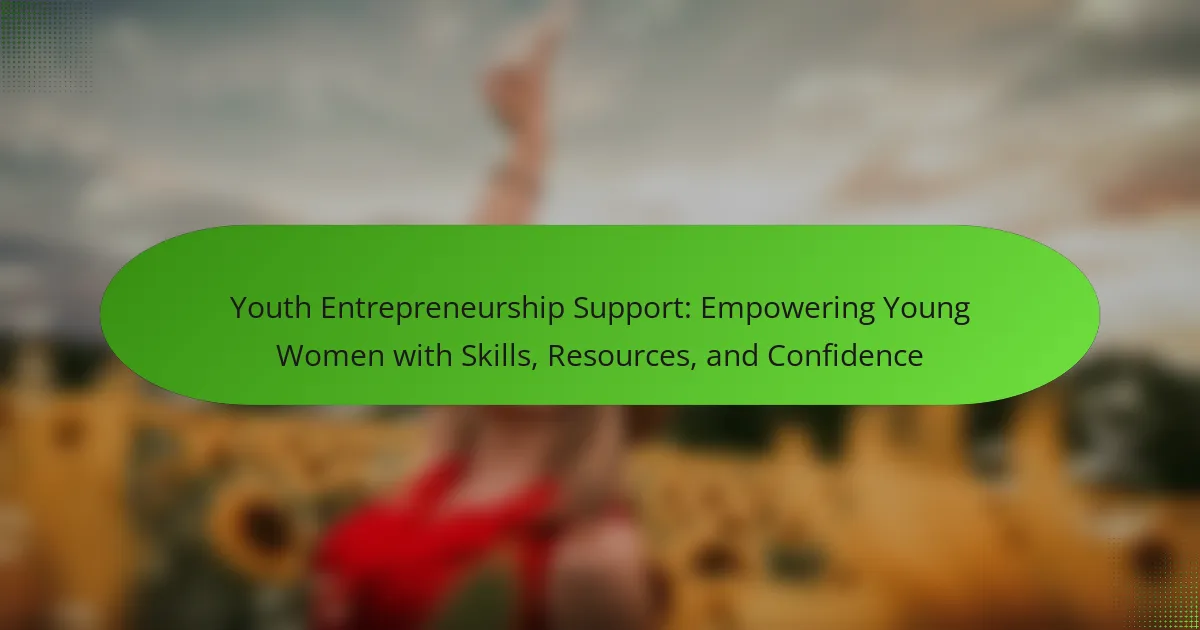Female entrepreneurs are redefining success through resilience, innovation, and leadership. This article explores their unique challenges, personal experiences that shape their journeys, and notable success stories like Sara Blakely and Oprah Winfrey. It also highlights resources and trends supporting women in business, emphasizing the importance of networking and community engagement.

What are the key characteristics of successful female entrepreneurs?
Successful female entrepreneurs exhibit resilience, innovation, and strong leadership skills. They often embrace challenges and learn from failures, which fosters growth. Additionally, they prioritize networking and collaboration, leveraging relationships to drive success. Their adaptability allows them to navigate changing markets effectively. Unique attributes include a focus on social impact and community engagement, which enhances brand loyalty and trust.
How do resilience and adaptability shape their journeys?
Resilience and adaptability are crucial for female entrepreneurs, shaping their journeys by enabling them to overcome challenges and pivot strategies. These qualities foster innovation, allowing them to respond effectively to market changes and setbacks. For instance, many successful female entrepreneurs leverage resilience to maintain focus and motivation, while adaptability helps them seize new opportunities. This combination often leads to unique business models that address unmet needs, showcasing their leadership in dynamic environments.
What innovative strategies do they employ in their businesses?
Female entrepreneurs utilize innovative strategies such as leveraging technology, fostering community engagement, and prioritizing sustainability. They often adopt digital marketing techniques to reach broader audiences efficiently. Many create networks that encourage collaboration and mentorship among women. Additionally, they focus on sustainable practices to appeal to conscious consumers. These strategies not only enhance their brand visibility but also contribute to long-term success.
What role does creativity play in problem-solving?
Creativity is crucial in problem-solving as it enables innovative thinking and unique solutions. Female entrepreneurs often leverage creativity to identify opportunities and overcome challenges. For instance, they may adopt unconventional approaches, which can lead to breakthroughs in their industries. This innovative mindset fosters resilience, allowing them to adapt and thrive in competitive environments.
How do they leverage technology for growth?
Female entrepreneurs leverage technology for growth by utilizing digital platforms, data analytics, and social media. These tools enhance visibility, streamline operations, and foster customer engagement. For instance, e-commerce platforms allow them to reach wider markets, while data analytics provide insights into consumer behavior. Social media serves as a powerful marketing tool, enabling direct interaction with audiences. As a result, these technological advancements drive innovation and resilience in their business models.
What leadership qualities set them apart?
Female entrepreneurs distinguish themselves through resilience, innovation, and strong leadership qualities. Key traits include adaptability, emotional intelligence, and visionary thinking. These qualities enable them to navigate challenges and inspire teams effectively. Research shows that women leaders often foster collaboration and inclusivity, enhancing team performance. Their unique approach to problem-solving and decision-making sets them apart in competitive landscapes.

What common challenges do female entrepreneurs face?
Female entrepreneurs face challenges such as access to funding, balancing work-life responsibilities, and overcoming gender biases. These obstacles can hinder their growth and innovation. For instance, women-led businesses receive only a fraction of venture capital funding compared to their male counterparts. Additionally, many female entrepreneurs struggle with networking opportunities, which are crucial for business success. Addressing these challenges is essential for fostering a more equitable entrepreneurial landscape.
How do societal expectations impact their business decisions?
Societal expectations significantly influence female entrepreneurs’ business decisions, often shaping their strategies and leadership styles. These expectations can create pressure to conform to traditional gender roles, impacting risk-taking and innovation. For example, research shows that female entrepreneurs may prioritize social responsibility and community engagement more than their male counterparts, reflecting societal values. Additionally, women may face unique challenges, such as access to funding and mentorship, which can alter their business trajectories. As a result, understanding these societal influences is crucial for fostering an environment where female entrepreneurs can thrive.
What funding barriers do they encounter?
Female entrepreneurs face significant funding barriers, including limited access to capital, bias from investors, and insufficient networking opportunities. These challenges hinder their growth and innovation potential. Research indicates that female-led startups receive only a fraction of venture capital compared to their male counterparts. For instance, in 2021, female entrepreneurs secured just 2.3% of total venture funding. Additionally, systemic biases often lead to undervaluation of female-led businesses, further complicating their funding prospects.

How do personal experiences influence their entrepreneurial paths?
Personal experiences significantly shape entrepreneurial paths by providing unique insights and resilience. Female entrepreneurs often draw from personal challenges, turning adversity into motivation. For instance, many have faced gender biases, which fuels their drive for innovation and leadership. These experiences cultivate problem-solving skills and adaptability, essential traits for success. Resilience emerges as a core attribute, enabling them to navigate obstacles and inspire others. Personal stories of triumph not only highlight individual journeys but also foster a supportive community, encouraging more women to pursue entrepreneurship.
What role does mentorship play in their success?
Mentorship significantly enhances the success of female entrepreneurs by providing guidance, support, and networking opportunities. Successful women often attribute their achievements to mentors who offer insights and encouragement. For instance, studies show that mentorship can increase the likelihood of career advancement by 25%. Additionally, mentors often share unique experiences, helping mentees navigate challenges effectively. This relationship fosters resilience and innovation, crucial attributes in entrepreneurship.
Who are some notable mentors for female entrepreneurs?
Notable mentors for female entrepreneurs include Sheryl Sandberg, Melinda Gates, Oprah Winfrey, and Indra Nooyi. These leaders exemplify resilience and innovation, guiding women in their entrepreneurial journeys. Their mentorship fosters skills in leadership and strategic thinking, essential for success in business.
How do family responsibilities shape their business strategies?
Family responsibilities significantly influence female entrepreneurs’ business strategies by fostering resilience, prioritizing flexibility, and promoting innovative solutions. These entrepreneurs often integrate family values into their business models, creating supportive environments that align with their personal commitments. For instance, balancing childcare and work responsibilities can lead to the development of remote working options or family-oriented products. As a result, these strategies not only enhance their business success but also reflect their unique experiences and values.

What unique success stories exemplify resilience?
Female entrepreneur success stories showcase resilience through innovation and leadership. One notable example is Sara Blakely, founder of Spanx, who overcame numerous rejections to build a billion-dollar brand. Another inspiring story is Oprah Winfrey, who transformed personal adversity into a media empire, emphasizing the power of perseverance. Additionally, Whitney Wolfe Herd, founder of Bumble, revolutionized the dating app industry by prioritizing women’s empowerment, demonstrating resilience in a male-dominated field. These stories illustrate how determination and creativity can lead to remarkable achievements.
Who are the trailblazers in various industries?
Female entrepreneurs have made significant impacts across various industries, showcasing resilience, innovation, and leadership. Notable trailblazers include Sara Blakely, founder of Spanx, who revolutionized women’s shapewear; Whitney Wolfe Herd, CEO of Bumble, who transformed online dating; and Reshma Saujani, founder of Girls Who Code, who advocates for women in tech. These leaders exemplify unique attributes of determination and creativity, inspiring future generations.
What innovative solutions have they created?
Female entrepreneurs have created innovative solutions that address market gaps and societal challenges. These include technology-driven platforms, sustainable products, and community-focused services. For instance, women-led startups in tech have developed apps that enhance accessibility for underserved populations. Additionally, many female entrepreneurs prioritize social impact, integrating sustainability into their business models. This unique approach not only drives profitability but also fosters community resilience.
What lessons can be learned from their journeys?
Female entrepreneurs teach valuable lessons in resilience, innovation, and leadership. Their journeys highlight the importance of perseverance in overcoming obstacles. They often emphasize the need for adaptability, showcasing how pivoting strategies can lead to success. Additionally, they illustrate the power of networking and mentorship in fostering growth. Many stories reveal that embracing failure as a learning opportunity is crucial for long-term achievement.

How can aspiring female entrepreneurs cultivate their success?
Aspiring female entrepreneurs can cultivate their success through strategic networking, continuous learning, and resilience. Building connections with mentors and peers fosters support and collaboration. Engaging in workshops and courses enhances skills and knowledge. Embracing challenges and learning from failures strengthens perseverance, essential for long-term success.
What best practices should they adopt?
To achieve success, female entrepreneurs should adopt resilience, innovation, and strong leadership. First, they must cultivate a growth mindset, allowing them to overcome challenges. Second, networking is essential; connecting with mentors and peers can provide valuable support and insights. Third, leveraging technology can enhance productivity and reach. Lastly, setting clear goals ensures focus and direction, fostering accountability and progress.
How can networking enhance their opportunities?
Networking significantly enhances opportunities for female entrepreneurs by expanding their connections and resources. It fosters collaboration, mentorship, and access to funding. Research shows that women who actively network are more likely to secure partnerships and clients. As a result, they can leverage these relationships to innovate and grow their businesses. Networking also builds confidence and visibility, essential attributes for leadership success.
What are effective ways to seek funding?
To seek funding effectively, female entrepreneurs can utilize several strategies. Networking is crucial; building relationships with investors can open doors to funding opportunities. Pitch competitions allow entrepreneurs to showcase their ideas and gain exposure. Additionally, applying for grants specifically aimed at women-led businesses can provide non-dilutive funding. Crowdfunding platforms enable entrepreneurs to raise capital while validating their business concept. Lastly, leveraging social media to share success stories can attract potential investors interested in supporting female-led ventures.
What common mistakes should they avoid?
Female entrepreneurs should avoid common mistakes that can hinder their success. Key errors include neglecting networking, underestimating the importance of market research, and failing to adapt to change.
1. Neglecting networking: Building relationships is crucial for support and opportunities.
2. Underestimating market research: Understanding the target audience drives informed decisions.
3. Failing to adapt: The business landscape evolves; flexibility is vital for sustained success.
4. Ignoring financial management: Proper budgeting and funding strategies are essential for growth.
5. Overlooking self-care: Maintaining mental and physical health supports long-term resilience.
How can they build a resilient mindset?
Female entrepreneurs can build a resilient mindset by embracing challenges and learning from failures. They can adopt a growth mindset, focusing on continuous improvement and innovation. Networking with other successful women provides support and inspiration. Setting clear goals and maintaining a positive outlook further strengthens resilience.

What resources are available for female entrepreneurs?
Numerous resources support female entrepreneurs, including mentorship programs, funding opportunities, and networking organizations. These resources foster resilience, innovation, and leadership among women in business.
Organizations like the National Association of Women Business Owners provide networking events and advocacy. The Women’s Business Enterprise National Council offers certification and access to corporate contracts. Additionally, platforms such as SheEO and Female Founders Fund focus on funding female-led startups.
Local initiatives often provide workshops and training tailored for women entrepreneurs, enhancing skills and confidence. Community support networks create spaces for sharing experiences and advice, promoting collaboration.
Access to these resources can significantly impact the success of female entrepreneurs, driving growth and innovation in their ventures.
What organizations support women in business?
Many organizations support women in business, providing resources, networking, and mentorship. Notable examples include the National Association of Women Business Owners, Women’s Business Enterprise National Council, and the Small Business Administration’s Office of Women’s Business Ownership. These entities offer unique programs that empower female entrepreneurs through training, funding opportunities, and advocacy. Their collective efforts foster resilience, innovation, and leadership among women in various industries.
How can online platforms facilitate their growth?
Online platforms can facilitate growth by providing resources, networking opportunities, and visibility for female entrepreneurs. These platforms enhance access to mentorship, funding, and collaborative projects. For example, platforms like LinkedIn and Facebook groups allow for community building and sharing of success stories, which inspire resilience and innovation. Additionally, online marketplaces enable female entrepreneurs to reach a broader audience, increasing sales and brand recognition.
What role do workshops and training programs play?
Workshops and training programs are vital for female entrepreneurs, providing essential skills and networking opportunities. They foster resilience, innovation, and leadership by offering practical knowledge and mentorship. Participants often report increased confidence and enhanced business acumen, leading to improved success rates. In 2022, 75% of women who attended such programs noted significant growth in their ventures.
How can they leverage social media for brand building?
Female entrepreneurs can leverage social media for brand building by engaging with their audience, sharing authentic content, and showcasing their expertise. Consistent interaction fosters community and builds trust. Utilizing platforms like Instagram and LinkedIn allows for targeted outreach and networking opportunities. Statistics show that 73% of marketers believe that their efforts through social media have been “somewhat effective” or “very effective” for their business. By sharing success stories and innovative ideas, female entrepreneurs can inspire others while enhancing their brand visibility.

What trends are shaping the future for female entrepreneurs?
Female entrepreneurs are increasingly shaping the future through innovation, collaboration, and resilience. Trends include a rise in digital entrepreneurship, a focus on sustainability, and community support networks. Female-led startups are leveraging technology to create scalable solutions, with 40% of women entrepreneurs reporting increased online sales. Additionally, mentorship programs are fostering leadership skills, enhancing access to funding, and promoting diversity in business. As a result, these trends are not only empowering women but also driving economic growth and innovation across industries.
What changes are expected in the business landscape by 2025?
By 2025, the business landscape will increasingly support female entrepreneurs through enhanced access to funding, mentorship, and networks. This shift is driven by a growing recognition of the economic impact of women-led businesses. Research indicates that companies with female leadership tend to outperform their peers, showcasing the value of diverse perspectives. As a result, initiatives promoting gender diversity in entrepreneurship are expected to flourish, creating a more inclusive environment that fosters innovation and resilience.
How can they adapt to evolving market demands?
Female entrepreneurs adapt to evolving market demands by embracing innovation, leveraging technology, and fostering strong networks. They continuously analyze consumer trends and pivot their strategies accordingly. For instance, many have shifted to e-commerce platforms to reach a broader audience. Additionally, they prioritize sustainability, aligning their businesses with eco-conscious practices. This adaptability not only enhances resilience but also positions them as leaders in their industries.



